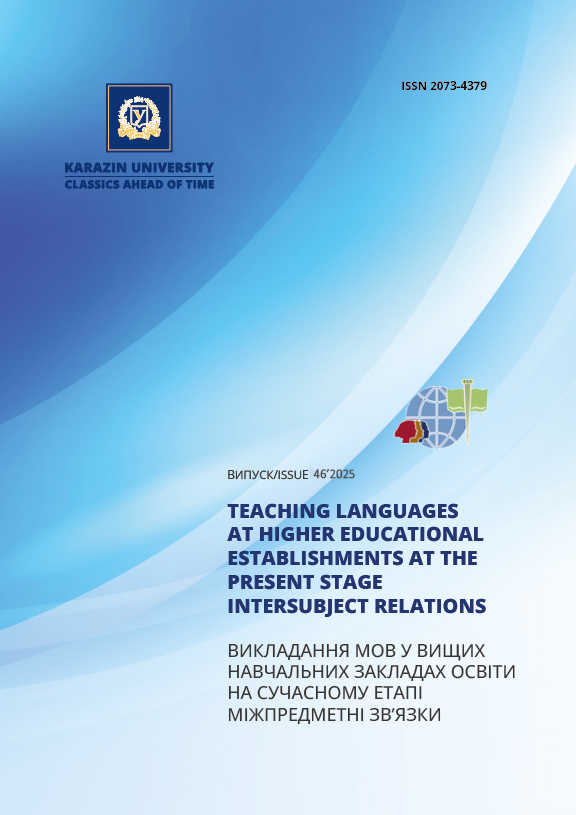The role of cognitive linguistics in the interdisciplinary coordination of foreign language teaching
Abstract
The article deals with the role of cognitive linguistics in the process of interdisciplinary coordination of foreign language teaching in higher education institutions. Cognitive linguistics is an interdisciplinary field that studies the relationship between language, cognitive processes, and cultural phenomena. It provides unique tools for improving the educational process and developing studentsʼ professional language competence. Particular attention is paid to the study of cognitive models that contribute not only to the development of language skills but also to the cognitive abilities necessary for successful professional activity. The use of cognitive linguistics in interdisciplinary coordination allows for a deep understanding of specific terminology in various fields of knowledge.
The author analyses the application of cognitive approaches through the integration of frame theories, metaphorical models, and cognitive maps into the process of teaching foreign languages. Language is seen not only as a tool of communication, but also as a means of shaping thinking and worldview. The application of cognitive theories allows students not only to master terms, but also to learn to conceptualise complex abstract concepts within a particular professional field. This is especially important for future professionals. Through these models, they acquire the ability to apply the language in different professional situations, taking into account the specifics of each particular industry.
The article presents examples of practical application of cognitive approaches in foreign language teaching. They include the analysis of professional terms, the use of metaphorical constructions to explain abstract concepts, and the creation of cognitive maps to visualise the links between different concepts. In particular, it is shown how cognitive maps contribute to more effective learning of complex terms and concepts. This is especially important for students learning foreign languages in the context of their professional activities. This approach not only contributes to the expansion of language competence, but also helps to form a more holistic view of the subject area.
The author of the article also highlighted her own experience of applying cognitive approaches in teaching specialised disciplines at Poltava State Agrarian University.
Downloads
References
Evans, V., Green, M. (2021). Cognitive Linguistics: An Introduction. Kyiv: Osnovy Publishing [in Ukrainian].
Kaniuk, O. (2021). Cognitive Approach in Foreign Language Teaching Methodology. Young Scientist, 3, pp. 78-81. DOI: https://doi.org/10.32839/2304-5809/2021-3-91-18 [in Ukrainian].
Kryshtaliuk, H.A. (2022). Linguo-Cognitive Approach to Studying English in Higher Education. Bulletin of Kamianets-Podilskyi National University Named after Ivan Ohienko. Series: Philological Sciences, 48, pp. 112-118 [in Ukrainian].
Muntian, L.A. (2021). Cognitive Linguistics in Ukraine: Current State and Prospects for Development. Bulletin of Kyiv National Linguistic University. Series: Philology, 24, pp. 30-35 [in Ukrainian].
Potapenko, S.I. (2020). Introduction to Cognitive Linguistics: A Textbook for Students. Nizhyn: Nizhyn State University Publishing [in Ukrainian].
Samarina, V.V. (2019). Methodological Approaches to Teaching German as a Foreign Language. Scientific Bulletin of the International Humanitarian University. Series: Philology, 39 (2), pp. 78-81. DOI: https://doi.org/10.32841/2409-1154.2019.39.2.20 [in Ukrainian].
Kholod, I.V. (2018). Methods of Teaching English: A Teaching Guide. Uman: Vizavi [in Ukrainian].

